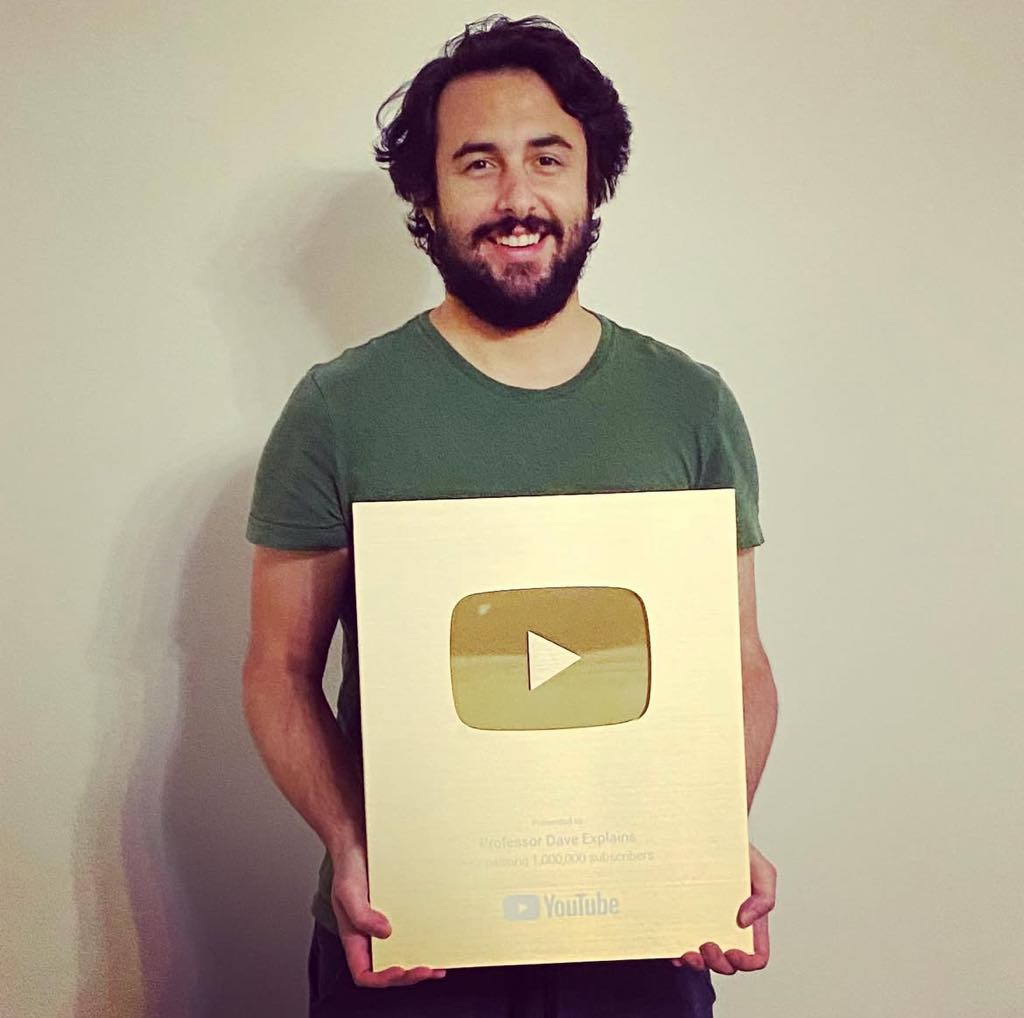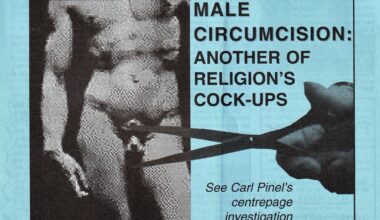Introduction
Dave Farina, known popularly as ‘Professor Dave’, is an American YouTube science communicator who has nearly four million subscribers. He has produced around 1,700 videos since the channel’s inception and is well-known for debunking the likes of creationists and flat-earthers. I spoke with him about his work and the continued potency of pseudoscience and conspiracy theories, and how best to combat them. Below is a transcript of our discussion, edited for clarity and concision.

Introduction
Samuel McKee: How did you get into your work?
Dave Farina: I did a bachelor’s degree in chemistry at Carleton College before doing graduate studies in synthetic and organic chemistry at UC Santa Cruz. To be honest, throughout my twenties, I was really only interested in music, not pursuing a science career. I was playing in bands and eventually did pretty well as part of a touring band. But we weren’t taking enough income home to pay rent, so I was looking for other ways to generate income. I noticed that some people were explaining science to students on YouTube to help them pass their classes. I had been teaching organic chemistry at a university and those lectures were fresh in my mind, so I put them on camera, posted them online, and waited to see what happened. I was rather surprised at how well they were received, so I did more videos on more subjects, going broader and deeper. Here I am ten years later, and it’s my full-time job!
You go really broad! You’re covering philosophy and ancient history as well now. Were you always interested in them, or is it more about demand?
I have always been interested in a lot of things. Certainly, there is a demand for any topic that is widely studied, like history. Once I realised that my goal was to become a formidable generalist, then obviously the goal of covering every academic subject became clear. I’m having fun learning a lot about lots of different topics. I’m hiring writers for subjects that are way outside of my expertise, but in making the tutorials, I end up having to learn the material as well in order to display it on screen. That’s been a lot of fun.
As well as being a generalist, you have broadened out to doing debates and live chats. What other directions might your channel go in?
I’m going to continue tearing through as many academic subjects as possible. I want my channel to always retain that base of generalised knowledge for academic pursuit, but I am also getting deeper and deeper into the line of debunking charlatans and frauds. I want to become as much of a public figure as possible in that area and possibly cross over into more traditional media with it. I would like to be a trusted figure in that area; someone who can help guide the public in recognising who is trustworthy and who is not.
It’s noble work! We live during a time of pseudoscience and attacks on science coming from everywhere, so there won’t be any shortage of work. Do you think things will get better or worse in future?
I don’t see much bad behaviour on the left; it’s almost exclusively on the right. There is a very deliberate campaign to dumb down the populace and dismantle any institutions that have the ability to keep the corporatocracy in check. It’s all done under the guise of draining the swamp, free speech, and getting rid of woke ideology, but these are all just dog whistles meant to disguise the real agenda, which is to undermine the concept of authority and discredit anybody who actually knows what they’re talking about and who could push back. It’s to generate a subservient and willfully ignorant populace, and it’s all built around a corporate agenda.
I think you articulate that as well as anyone. You’ve had some experience with trolls. Did they come after you because of your science videos, or did it all start when you addressed the flat-earthers?
I had minimal trolling prior to my debunking videos. It was very sporadic. Sometimes I’d get trolls going after my academic tutorials that dealt with topics like evolutionary biology, but it was almost non-existent. It was only once I got dragged into debunking the flat-earthers that I started getting that kind of attention, and it has only gotten worse and worse over the years as I have made myself more prominent in that space. Now it is relentless—on a minute-to-minute basis! You become kind of numb to it at a certain point.
That first video on flat-earthers really took off.
That was the first debunk I ever did. It really cemented my new path. I was really shocked at how many views it got and how much people liked it, and how good at it I was (I didn’t know that either). It all came together at that point: ‘Dave, this is the thing you need to be doing as well as your traditional academic content’. And I never looked back.
The other thing that blew up was the James Tour debate about the origin of life, which firmly put you in the crosshairs of the ‘intelligent design’ movement. Have you done many other debates apart from that and the Kent Hovind one?
The James Tour debate was the first in-person debate I did. The others have been online, predominantly with flat-earthers, which is a farce. The Tour debate was also a farce, but at least it was an intellectual topic as opposed to just defending basic logic [both laugh]. I’ve done very few, to be honest. I probably will do more, but it is not what I am most focused on as I don’t think it is the most effective tool for science communication. Still, it is an opportunity to broaden my reach and public image. It’s also fun.
Creationist/‘intelligent design’ activists are pushing hard in Britain right now. You are the only one I know of who has really gone after the Discovery Institute. With July 2025 marking the centenary of the Scopes Monkey Trial, how big a problem do you think creationism still is?
It remains an enormous existential problem. It is a war against science and an attempt to erode the separation of church and state and to get religion taught in public schools. I think that they are adapting. They know that secularism is on the rise, and rather than fight that they are kind of moving with it and trying to distance themselves from the image of the raving preacher, trying to seem as intellectual and academic as possible.
They have been somewhat successful in portraying themselves that way and tricking people into thinking they are rigorously empirical and academic. They sell the idea of controversy within the scientific community, whereas in reality, it is science versus religious propaganda. This is why they hate me so much, because I make content that shows up as the top search result for their names, which really puts them on full display, and it really exposes them. So they attacked me for a while, but then they realised that that made it worse, so now they just pretend I don’t exist! But I’m actually going to go back to debunking them. I stopped for a while, but there is more to do on that front.
Why do people fall for this? Even the odd non-religious type and people in government. ‘Intelligent design’ guys might have PhDs, but most of them have never published, or have published only one or two things. Yet people continually fall for it.
Well, the people peddling the propaganda aren’t falling for anything; they are frauds who know they are lying. They are being deliberately dishonest for money. The people who fall for it are exclusively religious because they feel they can intellectualise their faith. They have blind faith in their religious ideas and derive comfort from this pageantry, pretending they have an intellectual base for these religious ideas when in reality they are completely incompatible with modern science. So that’s really all it is.
Speaking as someone who goes after a lot of different kinds of pseudoscience and charlatanry, I would say that ‘intelligent design’ propaganda is among the most sophisticated and most convincing. They are smart, and they do a good job at distorting the primary scientific literature in a way that only those with significant education in those sciences can detect. And even then, it requires that you read the primary literature to see how they are lying. So people who have no ability to read those papers and want to believe the lies will immediately believe everything that they say, especially because they are wearing a suit and are well spoken and perceived as the intellectual equals of all the scientists they are lying about. I will give them credit for that! They are getting the level of propaganda that they are paying for. But then again, there are people like me who can sit in the house and make videos crapping all over them and take a big chunk out of their reach. Ultimately, the propaganda is not going to succeed, but it is alarming at how well it has been working.
Is there a science communication problem, too? Both in terms of enough people to do it well and in terms of the gap in public knowledge?
The biggest problem is that there are not enough people doing it. It is still a fairly nascent field in the sense of career science communication. People are still not familiar with the term. I go and give talks and there are even people working in the sciences who are truly unfamiliar with the concept of a career science communicator. Probably because it remains almost entirely in the space of entrepreneurship. A lot of people are reticent to embark on a path of entrepreneurship. I find it very invigorating and honestly could not work in any other capacity. But I try to encourage people in the sciences to consider this as a career path, and I think that right now we are just working at an enormous numbers deficit. We are outnumbered by the bad-faith actors and need a one-to-one ratio of science communicators to bad-faith actors.
I think this will start to change as more people are inspired to take this on as a career or in conjunction with their research careers. Once the numbers start to tip, we will see more unique voices with unique approaches that will be effective, and the tide will turn, but right now we are enormously understaffed.
I agree. Do you think scientists could be doing more? We should be reaching younger people in education.
Unfortunately, yes, scientists could be doing better. It’s not only that not enough scientists do science communication. I just wish that more scientists would work eagerly alongside science communicators to offer the credibility that goes along with their status. It would be great to see them assisting, giving interviews, and speaking candidly, speaking directly, about, for example, whether a source of information is legitimate or not.
Many of the academics with whom I correspond in preparing my debunking content are happy to correspond with me, but they are not eager to actually appear in the content. I wish more of them would do that and that, in doing so, they would be more direct. I understand academics wish to stay above the fray (and see themselves as above the nonsense of the internet), but given the state of things in America right now, they are starting to see that they aren’t and that their profession is in jeopardy. Politics informs funding and opportunities! Speak out, lend your voice! Because it really helps.
Let me ask you about the flat Earth stuff specifically. How do people fall for this? It’s been the most obvious thing for 2000 years. How is this infecting so many people, including teachers and more educated people?
It’s a cult. But it is truly the bottom of the barrel. I don’t think there are more than about 10,000 genuine flat-earthers in the world. They amplify themselves with bots and use other techniques to appear more numerous on the internet. It is truly a small community in comparison to anti-vaxxers, who number in the millions.
People who fall for the flat Earth conspiracy theory suffer a combination of delusional narcissism and extreme cognitive deficit. The dumbest people alive have convinced themselves that they are the smartest people alive. This is in stark contrast to other forms of science denial, which even intelligent people could potentially be persuaded by if the propaganda is good enough. For example, ‘intelligent design’ advocates and anti-vaxxers can be relatively sophisticated and thus convincing. Flat Earth, on the other hand, is just the dumbest thing that any human could possibly believe. The content flat-earthers put out is so transparently idiotic and debunkable by anyone with access to middle school physics knowledge and basic spatial reasoning—which is what makes it so fun to debunk them and why people enjoy the debunking content so much! It’s quite a unique cultural phenomenon.
Do you think that going back to the Moon would help deal with a lot of the flat Earth nonsense?
Not really. When you’re that far gone, everything is fake because you say so. Watching them deal with the aftermath of the Antarctica trip [a 2024 expedition by flat-earthers alongside ‘globe-earthers’ to test the flat Earth theory during which a midnight sun, which contradicts flat Earth beliefs, was observed; the broader flat Earth community rejected the finding as fake, with many accusing the flat-earthers on the trip of being part of a spherical Earth conspiracy] has been hilarious. The ways in which they pretend it was fake are not only ludicrous but also contradict each other. Some say they didn’t go, others say they did but that it was filmed in a dome. Some say it wasn’t a dome but an artificial light… Everybody’s saying something different, and they are all completely idiotic. If we got loads of footage back from landing on the Moon again, they’d say it’s just CGI this and AI that. They will deny anything.
What if Jeff Bezos did a charitable mission and flew a bunch of them up on a rocket?
Then they would all be shills! [Laughs] Of those that went to Antarctica, one is no longer a flat-earther, and another admitted that there was a 24-hour sun but is still a flat-earther somehow. Even admitting this got him cast out of the flat Earth community despite his efforts. It’s a really toxic and delusional community: there is no evidence and there are no facts, and there is no logic that can penetrate this delusion. Only by chance can individuals within it finally have their blind faith eroded and find their way out. There is not much that we can do to lead. At least, I haven’t found a way yet, even with my debunking.
Are you hopeful that you can help to rekindle excitement for real scientific discovery?
I definitely have hope, and I remain cautiously optimistic about the younger generations, who seem to have it more together than the older generations. The problem we face is due to media on the internet and manipulative figures poisoning minds with rhetoric. This can be combatted with counter-media on the internet if we can craft it to neutralise the poison. Then the problem would effectively be solved. What we are fighting is extremely well funded and well organised, however. It’s going to take quite an army or a revolution, but it can be done.
Is there a particular freethinker in history who has inspired you, or someone who has inspired your work?
Carl Sagan is the demigod of science communication. He set the mould of popularising science and captivating laypeople. He popularised science without diluting it, which a lot of science communicators unfortunately do. He’s the benchmark.









3 comments
Thank you for this fascinating and spirited conversation. It offers a vivid portrait of science communication as both a calling and a battleground. Dave Farina’s mission—equal parts education and resistance—resonates powerfully in an era awash with misinformation. His blend of clarity, courage, and curiosity is exactly what the public discourse needs. A compelling and timely read—much appreciated.
Regard Unissula
Someone has wisely explained the fanatcism with which delusions are firely defended. You can expect facts to change beliefs that were not formed using facts.
dave is a toxic dogmatic freak… yeah he has good content, but in a whole he is just a shame….
Your email address will not be published. Comments are subject to our Community Guidelines. Required fields are marked *
Donate